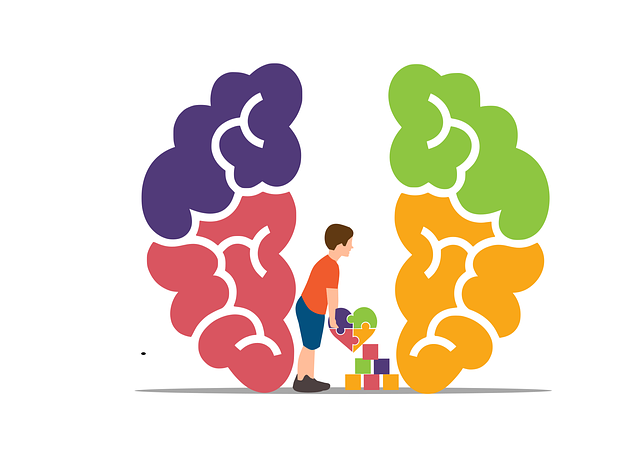Centennial Children Therapy tackles youth substance abuse with an evidence-based, multi-faceted approach. They emphasize early identification and intervention, focusing on mood management, self-awareness, risk assessment, and family dynamics to prevent cognitive and behavioral issues linked to drug use. Their holistic treatment plans combine personalized strategies for emotional healing, social skills training, and community engagement to reduce abuse risks and promote mental wellness in adolescents and young adults.
Substance abuse among youth poses significant risks, impacting their physical and mental health, academic performance, and future prospects. This comprehensive guide explores effective risk reduction strategies, from understanding the issue’s severity to implementing evidence-based solutions. We delve into early intervention techniques that foster resilience in children, family-centric approaches, and the role of community support. Discover how Centennial Children Therapy leverages these methods, combining them with evidence-based therapies for lasting recovery outcomes.
- Understanding the Impact of Substance Abuse on Youth
- Early Intervention: Building Resilience in Children
- Family-Based Risk Reduction Techniques
- Evidence-Based Therapies for Long-Term Recovery
- Community Support and Preventive Measures at Centennial Children Therapy
Understanding the Impact of Substance Abuse on Youth

Substance abuse among youth is a pressing issue that demands immediate attention and targeted interventions. The impact on young individuals can be profound, affecting their physical health, mental well-being, academic performance, and future prospects. According to research, early exposure to substances can disrupt brain development, leading to long-term cognitive and behavioral issues. Centennial Children Therapy emphasizes the critical need for early identification and intervention strategies to mitigate these risks.
The consequences of substance abuse in adolescence often extend beyond immediate health hazards. It can contribute to a cycle of addiction, antisocial behaviors, and impaired decision-making abilities. To combat this, therapy centers like Centennial Children Therapy employ various evidence-based practices. These include mood management techniques, self-awareness exercises, and comprehensive risk assessment tools for mental health professionals to identify at-risk individuals promptly. By addressing the root causes and providing support systems, these strategies aim to foster healthy development and reduce the likelihood of substance abuse among young people.
Early Intervention: Building Resilience in Children

Early Intervention plays a pivotal role in mitigating substance abuse among young individuals. By focusing on building resilience in children, we can potentially alter trajectories that could lead to later addiction. Centennial Children Therapy emphasizes proactive strategies such as nurturing emotional intelligence, teaching effective coping mechanisms, and fostering strong social connections. These approaches aim to equip children with the tools they need to navigate challenges without resorting to substances.
This proactive stance is crucial in light of growing concerns about burnout prevention strategies for healthcare providers and the importance of compassion cultivation practices. Mental wellness coaching programs development can further enhance these efforts by providing additional support systems both at home and within educational settings. Through comprehensive programs, we can cultivate a culture that prioritizes mental wellness from an early age, thereby reducing the risk factors associated with substance abuse.
Family-Based Risk Reduction Techniques

Family-based risk reduction techniques have emerged as a powerful tool in addressing substance abuse issues, especially among adolescents and young adults. Centennial Children Therapy focuses on fostering healthier family dynamics to mitigate the chances of substance misuse. By implementing empathy building strategies, families can enhance communication and understanding, reducing potential triggers for addiction. This approach aims to strengthen bonds and improve conflict resolution skills, creating a supportive environment that encourages mental health awareness and prevents substance abuse.
Additionally, Social Skills Training is an integral part of these interventions, teaching individuals effective ways to interact with peers and manage social pressures. Equipping family members with tools to navigate challenges together can significantly lower the risk of substance abuse, promoting overall well-being and resilience.
Evidence-Based Therapies for Long-Term Recovery

In the pursuit of long-term recovery from substance abuse, evidence-based therapies play a pivotal role in fostering holistic healing and preventing relapse. Centennial Children Therapy, for instance, focuses on individualized treatment plans that address not just the addiction but also the underlying emotional and psychological issues. These therapeutic approaches are designed to strengthen inner strength and coping skills development, enabling individuals to manage triggers effectively and maintain sobriety.
The process often incorporates empathy building strategies, fostering a sense of understanding and self-compassion that is crucial for long-term success. By combining evidence-based practices with tailored interventions, therapy programs equip participants with the tools needed to navigate challenging situations, cultivate resilience, and lead fulfilling lives free from substance abuse.
Community Support and Preventive Measures at Centennial Children Therapy

At Centennial Children Therapy, community support and preventive measures play a pivotal role in reducing risks associated with substance abuse among youth. The therapy center actively engages with local communities through its Community Outreach Program Implementation, aimed at raising awareness about substance misuse and its detrimental effects. This initiative includes educational workshops, interactive seminars, and peer-led discussions designed to equip young individuals with the knowledge and skills to resist substance temptations.
Additionally, Centennial Children Therapy promotes burnout prevention strategies for healthcare providers, ensuring that front-line staff remain resilient and effective in supporting vulnerable youth. They encourage mental wellness through simple yet powerful practices like journaling, offering Mental Wellness Journaling Exercise Guidance. This not only fosters self-reflection but also provides a safe space for clients to express their thoughts and emotions, contributing to overall well-being and reducing the risk of substance abuse as a coping mechanism.
Substance abuse among youth is a complex issue, but with comprehensive strategies like early intervention, family-based techniques, evidence-based therapies, and robust community support, we can significantly reduce risks. Centennial Children Therapy exemplifies these approaches, offering preventive measures that empower young individuals to make healthier choices. By implementing these risk reduction strategies, we foster resilience and create a brighter future for our youth.














